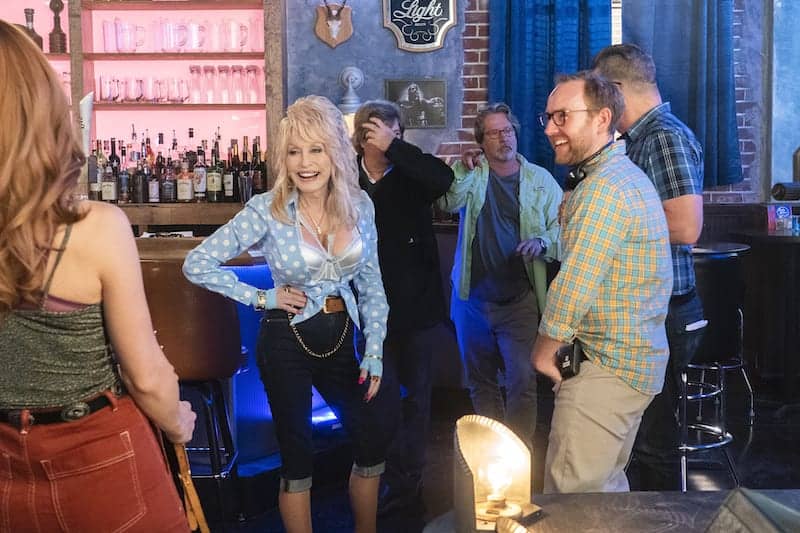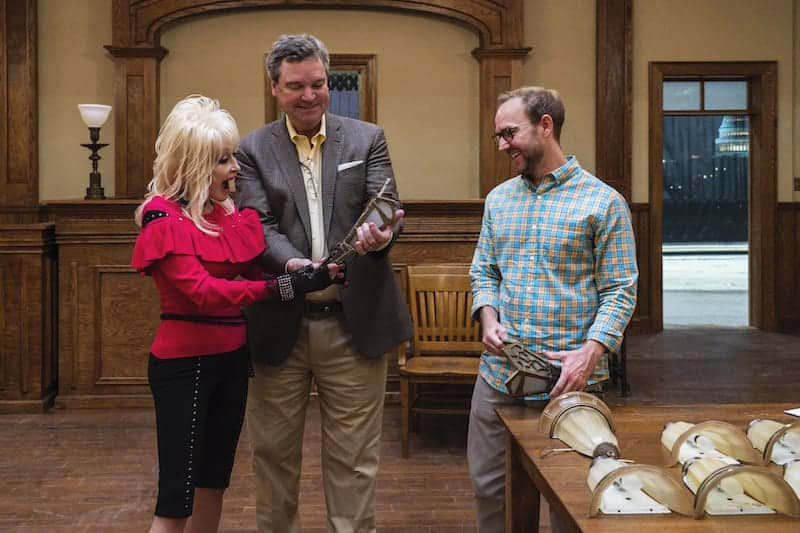
There's a moment in the trailer for Dolly Parton's new anthology series Heartstrings, dropping today on Netflix, where two well-dressed men share a champagne toast “to new beginnings.” One need not have too sophisticated a gaydar to get some vibes.
It would certainly track with the LGBTQ icon‘s history of support and admiration for the community. As one of country music's biggest stars, Dolly transcends the typical audience demographics. The New York Times recently answered the question “Is There Anything We Can All Agree On?” with an emphatic “Yes: Dolly Parton.”
The beloved entertainer's appeal is on full display in Heartstrings, a collection of eight stories inspired by Dolly's music. In addition to the aforementioned “Two Doors Down,” the series brings to the life vivid storytelling and unforgettable characters from Dolly's vast catalog of songs, including J.J. Sneed, Cracker Jack and, of course, Jolene.
Parton fans have a lot to sink their teeth into, but in true Dolly fashion, there's a lot here for all folks to enjoy. The gentle, Hallmark movie-esque tone makes Heartstrings an easy (and crowd-pleasing) choice to stream when you're looking for something to binge watch after you, well, binge on dinner, wine, etc.
You'll even be able to laugh along with someone else's family drama in the “Two Doors Down” episode, which does, in fact, feature an LGBTQ storyline. The show's inclusive spirit is not driven by Dolly's love and generosity alone. Showrunner Patrick Sean Smith, himself a member of the LGBTQ community, developed the episode with writer Mark Perry and drew from their own experiences.
It's not Smith's first time bringing LGBTQ characters to life on screen. He received praise for his work on Greek, a dramedy about fraternity life on campus which featured a gay pledge, Calvin.
We had the chance to chat with Smith about Heartstrings, LGBTQ TV characters and what it's like to be on a phone call with Dolly Parton and Kathleen Turner. Check out our interview below!
I'd love to hear how you got involved with this project.
I first started working with Dolly and Sam on a CW version of Jolene, which was two years back, and they were interested in kind of doing a Southern soap based on that character. I wrote the pilot, and while we were waiting to hear what the decision was, Sam and Dolly had gone to Netflix to pitch this anthology series. They bought it, and I was fortunate enough to be asked to be a part of it having established that relationship with Dolly and Sam, so that's how I came into it.
How did you and Dolly connect in the first place?
It came through my agency, and they asked if I knew the song “Jolene.” I am from Texas and gay, so obviously I had. I met with Sam, and we just hit it off. Then I had lunch with Dolly, and I think we connected on a lot of the emotional storytelling that we love to do and love to see. Coming from a place of wanting to put more positivity out in the world was bonding as well. We worked a lot together through Jolene, and then once the anthology series came about, it became more personal, having opportunities and responsibilities to sit down and say, ‘Where did this song come from?' and ‘How can we honor the source in this episode?' Just to make sure we still have that personal nature that she does so well. It's why her music still resonates with so many people today.
I want to talk specifically about the episode for “Two Doors Down.” What was the inspiration for that?
We wanted to do something that honored Dolly's LGBTQ audience, absolutely, and as a gay man running the show, it was important for me to have that, as well. It was just trying to find that story that could still feel like it can include the experiences for so many, which is how it became the family story. What I love about the song, the song is incredible, but I love the emotional journey. It's really, at its core, about someone who is sitting in obstinance being sad, and there's hope and there's a party if you could just get yourself there … It was personal for me and for Mark Perry, who wrote the episode, we had a very similar coming out experience with our mothers. We got to mine a lot of that in the episode.
You've written LGBTQ stories for television before, like Calvin on Greek. What's your personal approach to telling LGBTQ stories?
I think I've always been mindful of trying to find the positive of the experience, and not focusing solely on the tragedy or the negative aspect of it. That, for me, is more inspiring than just seeing the dark side of things. That's where a lot of Calvin came about. For me, a lot of times, you can look at it one of two ways. I think I can try to move past just what I've seen before.
There is this overall positivity to these stories. We're seeing more and more of these feel-good shows. Art like that tends to be described in the pejorative or dismissed, this sort of Hallmark-style content. What do you think is the power of this content?
I did Greek over 10 years ago, and, at that time, there were other shows that were darker. It was the rise of the anti-hero at the time, and I never really connected with any of those shows, because you leave feeling bad. A lot of what Dolly loves to do is she loves to make you feel, but she also loves to entertain you. That's what felt like an opportunity here for something that hadn't been done. … One thing that Dolly and I connected on early is that she is a religious woman. She's a woman of faith. Having grown up in Texas, I've seen so many people who have struggled through life, and their faith and religion helped them through that. I think wanting to never tear somebody down for something that's helping them get through life on any side of it, whether it's your community, whether it's your faith, whatever it is. If something makes you feel good, it just seems logical. Critically, it does tend to be dismissed as too easy. I think with everything that's happening with the world right now, people are willing to look past that and see the good in that. As I've gotten older, too, being responsible for what I'm putting out in the world. I take it more seriously now as a dad and somebody who's been married to his husband for 11 years. We're proud of that, and we want to share that experience and energy more than another TV series about somebody who is murdered or overdoses.
It's interesting, because Dolly is in the midst of the big media renaissance, thanks to Heartstrings and an excellent new podcast. Why is Dolly so vital right now?
The thing that I think is so incredible about Dolly is that she just has this magic that's around her. The fact this is all happening to her is not by any design. It's not like she feels that she can exploit this opportunity or take advantage of it. She's always been putting this out there. I think people are just starting to honor it more and respect it more. New generations are able to see the way she approaches what she puts out there, which I think is awesome … I just think she's an incredible woman, and she's always been authentic to who she is. To see someone who's been able to do that through her career as long as she has, it's inspiring to me, and I hope it inspires more people to do the same and not feel like they have to go to some place for the sake of shock just to get attention.
What's one of your favorite memories working on Heartstrings?
I have a ton, but I think my favorite one, in the very beginning, was when we cast Kathleen Turner in “These Old Bones.” She and Dolly were both on the East Coast, and they're both early risers, so they wanted to get everyone on the phone together to talk about the show … Because they were on the East coast, it was 7 a.m. my time. I have a son, so I'm up at 6. It wasn't about the time, but I had to stand outside away from my son, who can get loud. To listen to a conversation between Kathleen Turner and Dolly Parton — I've had so many pinch moments, but that one?! And the men said not a word! The women talked the entire time, and there was no interruption, no mansplaining. [We were] just sitting back listening to these two amazing, awesome women talk about the time that they were both working on the Fox lot. Kathleen Turner was shooing War of the Roses, and she wanted to meet Dolly Parton. So, she walked over to her trailer and knocked on the door. And that was the first time they met. It was hilarious. It was an opportunity of a lifetime. Little gay Sean was just jumping out of his skin, losing his mind. It was insane.

What surprised you most about this experience?
The first thing that pops into my mind — and there are a ton, I could talk for hours about it, really — but there were so many moments to work with someone like Dolly where you think, because of all that's she's accomplished and who she is, that she wouldn't react as emotionally and humbly as she did to this experience. It was when we were shooting “These Old Bones,” and she came to set and was overwhelmed emotionally. She saw the mountain woman shack and Kathleen dressed as her, and she was just humbled by it. She was on a set with a crew, and she became emotional. She wasn't there to show off, she was there to really connect with the fact that she knew this woman when she was 7, then she wrote a song about her in the late-'60s/early-'70s and now it's 2019 and she's on set with Kathleen Turner playing her. Who has that life experience? She knows she's fortunate to have it. Her gratitude and just being humbled by all of this is another good reminder for people who get to do what we get to do.
What do you hope viewers walk away with when they finish the series?
I just want everybody to feel good and want to feel. With the holidays, people are much more open and receptive to that than when you start to get in the grind of daily life and you don't want to give yourself time to do that. I hope they get more insight into the special woman who Dolly is. Not just facts about her life or anything autobiographically as much as these are eight hours that are precious to her for a reason, and I think those reasons are in there.
Stream Heartstrings now on Netflix.



